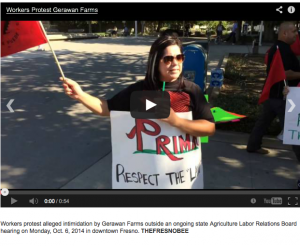One of the most significant labor relations fights in the country is currently taking place in California, yet much of the media has tried to ignore it. I’ve been writing about and covering this alarming situation for several years.
Reminiscent of former Venezuelan President Hugo Chavez, who was notorious for nationalizing private industries and businesses in true Marxist-Leninist form, the California Agricultural Labor Relations Board is also aggressively going after Gerawan Farming, Inc., one of California’s largest private farming employers. In what can only be described as an attempt to misappropriate the stable, successful company, the ALRB is paving the way for a union takeover, and a total business shakedown.
Gerawan Farming has been family owned and operated since 1938, and employs thousands of skilled farm workers every year to help grow and harvest table grapes and tree fruits. But by attempting to force a company into a contract with a union, the ALRB is violating First Amendment protections guarantying freedom of association.
Historic Labor Relations Fight
There is no agreement between the United Farm Workers labor union and Gerawan Farming, and no evidence the UFW ever attempted good faith negotiations with Gerawan.
Proceedings have turned ugly, with many questioning the legal tactics and constitutionality of the Agricultural Labor Relations Board.
As the United Farm Workers labor union and the state Ag Labor Board found themselves in recent years on the brink of extinction and potential irrelevance, they joined forces to reverse their misfortune by targeting one of the biggest non-union farming operations in the state. Should they eventually succeed in unionizing the 5,000 Gerawan Farming employees, it would more than double UFW union membership, and certainly give the ALRB something more to do.
The California Legislature is responsible for authority and oversight of this state board. But there has been no oversight from the Legislature, or from Gov. Jerry Brown, despite numerous personal appeals to the governor and the Latino Caucus, from the thousands of Gerawan farmworkers and many lawmakers. I’ve personally witnessed attempts by the farmworkers to the Legislature and the governor.
And, this all started when Sylvia Torres- Guillén was appointed ALRB General Counsel by Gov. Jerry Brown in 2012. The general counsel of the Agriculture Labor Relations Board went to court in April to impose a union contract on Gerawan Farming employees, without proper input from the farm workers, and without counting the ballots of a United Farm Workers union decertification election, held in November 2013.
UFW was MIA for 23 Years
The UFW won an election to represent Gerawan Farming’s workers 23 years ago. But after only one bargaining session, the union disappeared and wasn’t heard from for more than 20 years.
The wrangling with the United Farm Workers Union began again in October of 2012, when the union insisted that a collective bargaining agreement covering Gerawan workers be reactivated — even though there had been no union involvement with the workers for decades. Some of the workers then began a process for a vote to decertify the union.
The Gerawan Farming workers gathered thousands of signatures to petition a vote on decertification, and eventually won an election – but only after the ALRB rejected their first two petitions, claiming many of the signatures were fraudulent.
Finally, an election to decertify the union was held on November 5, 2013. But instead of counting the votes, which most likely would lead to decertification, the ALRB impounded the ballots, and initiated legal proceedings against Gerawan Farming, Inc. Then, on November 19, 2013, the ALRB adopted the collective bargaining agreement and Mandatory Mediation, after which the UFW filed an enforcement action to force Gerawan to comply.
ALRB Executive Director J. Antonio Barbosa also charged Gerawan with “misconduct, that allegedly affected the outcome of the election.”
However, a State Superior Court judge didn’t buy the UFW’s legal argument:
“Unfortunately, there are no provisions of the Agricultural Labor Relations Act governing the Mandatory Mediation Process that permit the Agriculture Labor Relations Board to seek temporary relief during the pendency of the 30-day period for seeking appellate review,” Superior Court Judge David Brown said, quoting from a similar 2012 case, Ace Tomato Company Inc., v. United Farm Workers.
“As in unfair labor practice proceedings, the Board’s decisions are not self-enforcing,” said the judge. “Rather, in order to enforce its decisions, the Board must first obtain a judgment.” And judgments are obtained through the Superior Court.
The judge explained legislative intent should be gathered from the whole legislative act, rather than cherry-picking a few words or isolated parts.
In other words, the judge told the UFW that words matter, especially in context.
In November 2014, the California Court of Appeal in Fresno granted Gerawan’s request to review the constitutionality of the UFW’s forced contracting scheme without farm workers consent.
“No other state in the nation allows the government to draft and enforce a collective bargaining agreement on a private employer,” company President Dan Gerawan said. “No other law permits a state agency to dictate that workers must pay dues to a union or to lose their jobs, or bar the right of private employees from exercising their First Amendment right to picket, boycott, or strike.”
The ALRB’s order is a violation of the Constitution and workplace democracy – “the right of all workers to choose whether the UFW, or any union, may speak in their name, or to bind them to a contract,” Gerawan added.
The National Federated of Independent Business filed an amicus brief in support of Gerawan Farming in April, in which they argued that the ALRB lacks the constitutional power to force a non-consenting business into a collective bargaining agreement with UFW. That’s the question the court will consider on the merits–if they get to the merits.
The ALRB
The Agricultural Labor Relations Board says it exists to protect the rights of all agricultural employees, including those not wanting labor organization representation, as is the case with Gerawan Farming employees. However, Gerawan farming employees say they have not received any assistance from the ALRB.
Whenever they can, labor unions historically try to gain control over entry into the labor market. “Such measures are for the purpose of holding down the supply of labor in the field and thereby enabling those fortunate enough to be admitted to it, to earn higher incomes,” wrote George Reisman of the Ludwig von Mises Institute.
“Imposing a contract that has not been negotiated by our employees and before ballots have been counted to determine if our employees have allowed the UFW to speak on their behalf is illegal, immoral, and nonsensical,” farming company President Dan Gerawan said. “At best, forcing a contract on employees without their participation is unjustly premature. Until the results of the decertification ballot results have been acknowledged by the ALRB, our employees should not face the outrageous decision of either having to pay dues to a party that has not earned the right to represent their interests or losing their employment.”



